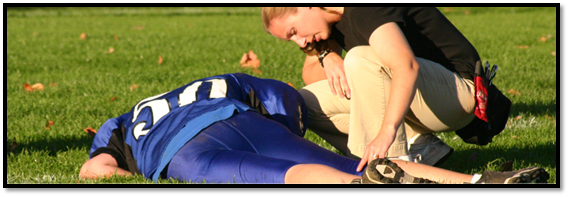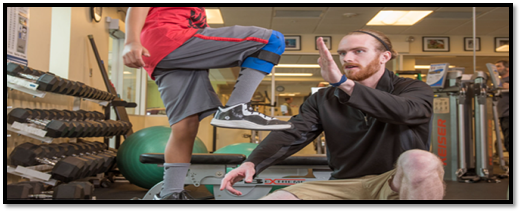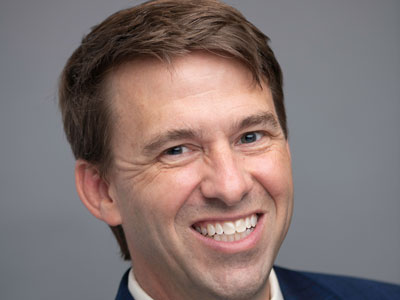12/02/2022
Considering Careers in Sports Medicine
By Christopher J. Couture, MD, Wentworth Health Partners Seacoast Orthopedics & Sports Medicine
As you move through your experience as a high school athlete and look to the future, you might be interested in careers that will keep you involved in sports. Perhaps you’ve had an injury yourself, and as you’ve recovered and returned to playing your sport, you have appreciated the assistance of sports medicine professionals and become motivated to help other athletes going through similar experiences. There are many options for careers in sports medicine - here I will highlight some of the most common. Much of the information here is taken from websites of the professional organizations representing these occupations.

Athletic Training
- The athletic trainer is usually your most immediate contact to the world of sports medicine. This is the person who is there on the sideline in the training room, ready to evaluate an injured athlete and manage day-to-day care.
- Athletic training encompasses the prevention, examination, evaluation, treatment and rehabilitation of emergent, acute or chronic injuries and medical conditions.
- Athletic Trainers (ATs) are health care professionals who work under the direction of physicians, as prescribed by state licensure statutes.
- ATs specialize in patient education to prevent injury and re-injury.
- Many athletic trainers work outside of athletic settings; they provide physical medicine and rehabilitation and other services to people of all ages.
- ATs work in:
- Physician offices as athletic trainers in a physician practice, similar to nurses, physician assistants, physical therapists and other professional clinical personnel.
- Rural and urban hospitals, hospital emergency rooms, urgent and ambulatory care centers.
- Clinics with specialties in sports medicine, cardiac rehab, medical fitness, wellness and physical therapy.
- Occupational health departments in commercial settings, which include manufacturing, distribution and offices to assist with ergonomics.
- Police and fire departments and academies, municipal departments, branches of the military.
- Public and private secondary schools, colleges and universities, professional and Olympic sports.
- Youth leagues, municipal and independently owned youth sports facilities.
- To practice as an athletic trainer, one must graduate from an accredited bachelors or master’s program; 70% of practicing athletic trainers have master’s degrees and doctorates are becoming increasingly common.
National Athletic Trainers’ Association – www.nata.org for more information

Strength & Conditioning
- A strength and conditioning coach is a physical performance professional who uses exercise prescription to improve the performance of competitive athletes or athletic teams. This is achieved through the combination of strength training, aerobic conditioning, and other methods.
- Unlike an athletic trainer, a strength and conditioning coach is focused primarily on sport performance. The coach helps athletes with injury prevention, through strengthening and coaching of movement mechanics within a sport.
- In the US, The National Strength and Conditioning Association offers a Certified Strength and Conditioning Specialist (CSCS) qualification that is often considered the gold standard for positions in the field. A bachelor's degree is a prerequisite for the CSCS and it is encouraged to attain such degree in majors that are related to exercise science due to the competitiveness of the field.
- The Collegiate Strength & Conditioning Coaches association also offers certification exclusive to the collegiate and professional-level strength and conditioning coach. This certification is known as Strength & Conditioning Coach Certified (SCCC) and requires a bachelor's degree and a 640-hour internship in addition to passing the certification exam.
National Strength & Conditioning Association – www.nsca.com for more information
Exercise Physiology
- An Exercise Physiologist (EP) analyzes the effects of exercise on the human body. Much of what we know about physiological responses to various types of physical activity, exercise intensities and geographical climates comes from their research. They study a wide range of applied physiology topics, such as muscle composition, cardiorespiratory capacities and how energy is used and produced during exercise.
- EPs usually hold a bachelor’s or master’s degree in exercise science or kinesiology and often obtain advanced certification.
American Society of Exercise Physiologists – www.asep.org for more information
Physical Therapy
- Physical therapists are movement experts who improve quality of life through prescribed exercise, hands-on care, and patient education.
- Physical therapists diagnose and treat individuals of all ages, from newborns to people at the end of life. Many patients have injuries, disabilities, or other health conditions that need treatment. But PTs also care for people who simply want to become healthier and to prevent future problems.
- To practice as a physical therapist in the U.S., you must earn a Doctor of Physical Therapy degree from a Commission on Accreditation in Physical Therapy Education-accredited physical therapist education program and pass a state licensure exam. The doctorate is completed after earning your bachelor’s degree.
- The length of professional DPT programs is typically three years. Primary content areas in the curriculum may include, but are not limited to, biology/anatomy, cellular histology, physiology, exercise physiology, biomechanics, kinesiology, neuroscience, pharmacology, pathology, behavioral sciences, communication, ethics/values, management sciences, finance, sociology, clinical reasoning, evidence-based practice, cardiovascular and pulmonary, endocrine, and metabolic, and musculoskeletal.
American Physical Therapy Association - www.apta.org for more information

Physician
- Sports medicine physicians include nonsurgical and surgical specialties that focus their practice on health care for athletes and physically active individuals.
- There are multiple pathways toward working in sports medicine as a physician. One attends medical or osteopathic school after earning a bachelor’s degree - usually a four-year program toward the MD or DO degree. After completing medical school, specialty training involves a residency of 3-4 years for nonsurgical specialties or 5 years for orthopedic surgery, followed by another 1-2 years of fellowship training in sports medicine
- Non-surgical sports medicine involves:
- Comprehensive health care for the active patient, including diagnosis and treatment of sports or activity-related and unrelated injuries and illnesses.
- Use of manual techniques to prevent and treat muscular and skeletal conditions common in athletes.
- Special knowledge of the principles of athletic conditioning.
- Focus on injury prevention and rehabilitation, including injuries common to specific sports.
- Nutritional guidance to build strength and endurance in support of athletic performance.
- Non-surgical specialties that can lead to fellowship training in sports medicine include family medicine, internal medicine, pediatrics, physical medicine & rehabilitation (a.k.a. PM&R or physiatry)
- American Medical Society for Sports Medicine –www.amssm.org for more information
- Surgical sports medicine physicians are usually orthopedic surgeons who repair damage to tendons, ligaments, and joints
American Orthopedic Society for Sports Medicine – www.aossm.org for more information
Additional Resources
American College of Sports Medicine – www.acsm.org
 About Dr. Christopher Couture
About Dr. Christopher Couture
Dr. Christopher Couture is certified in Family Medicine and Sports Medicine by the American Board of Family Medicine, and is a member of the American Medical Society for Sports Medicine. He specializes in the evaluation and non-surgical treatment of musculoskeletal injuries, as well as the full range of non-musculoskeletal sports medicine conditions. He is also proficient in the use of ultrasound for musculoskeletal diagnosis and procedures, and is Registered in Musculoskeletal Sonography.
Dr. Couture serves as Head Team Physician at the University of New Hampshire. He is also the Head Team Physician for United States Nordic Combined, providing medical coverage for the team’s World Cup events and monitoring the athletes’ health and well-being.